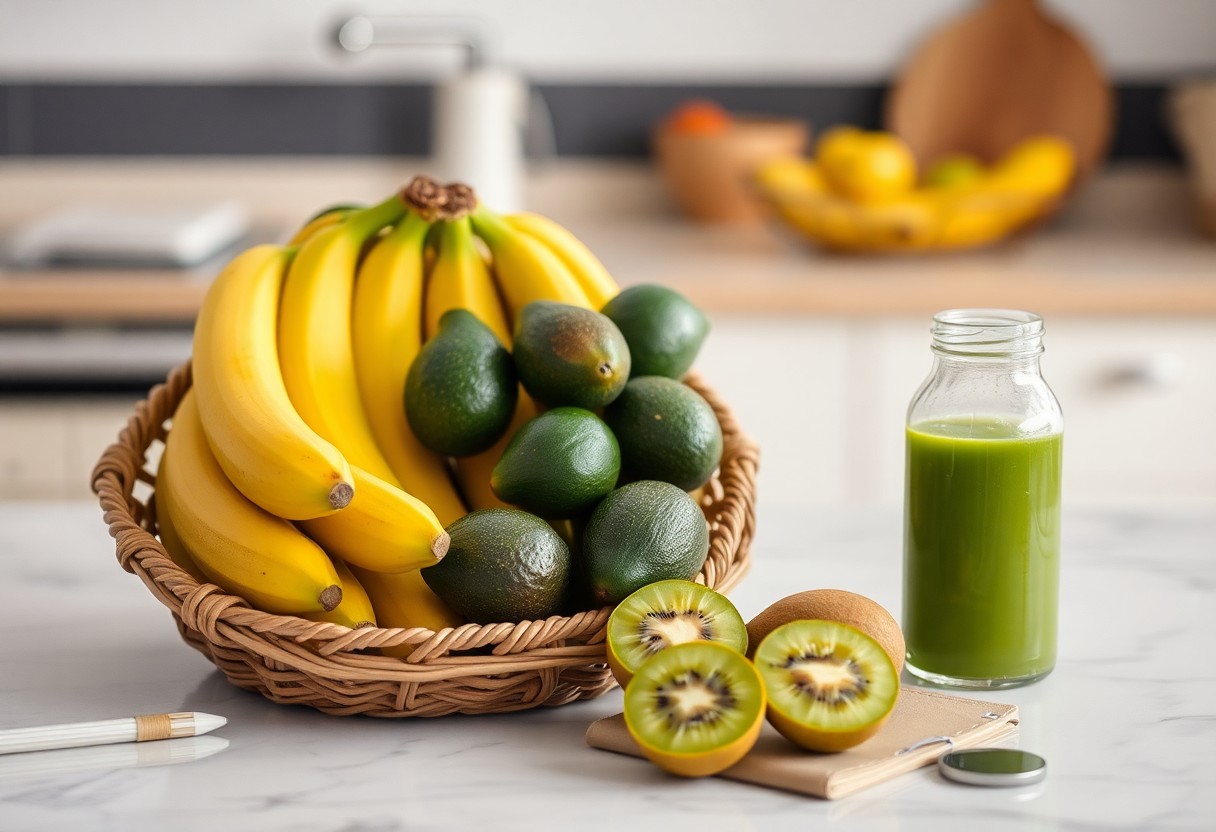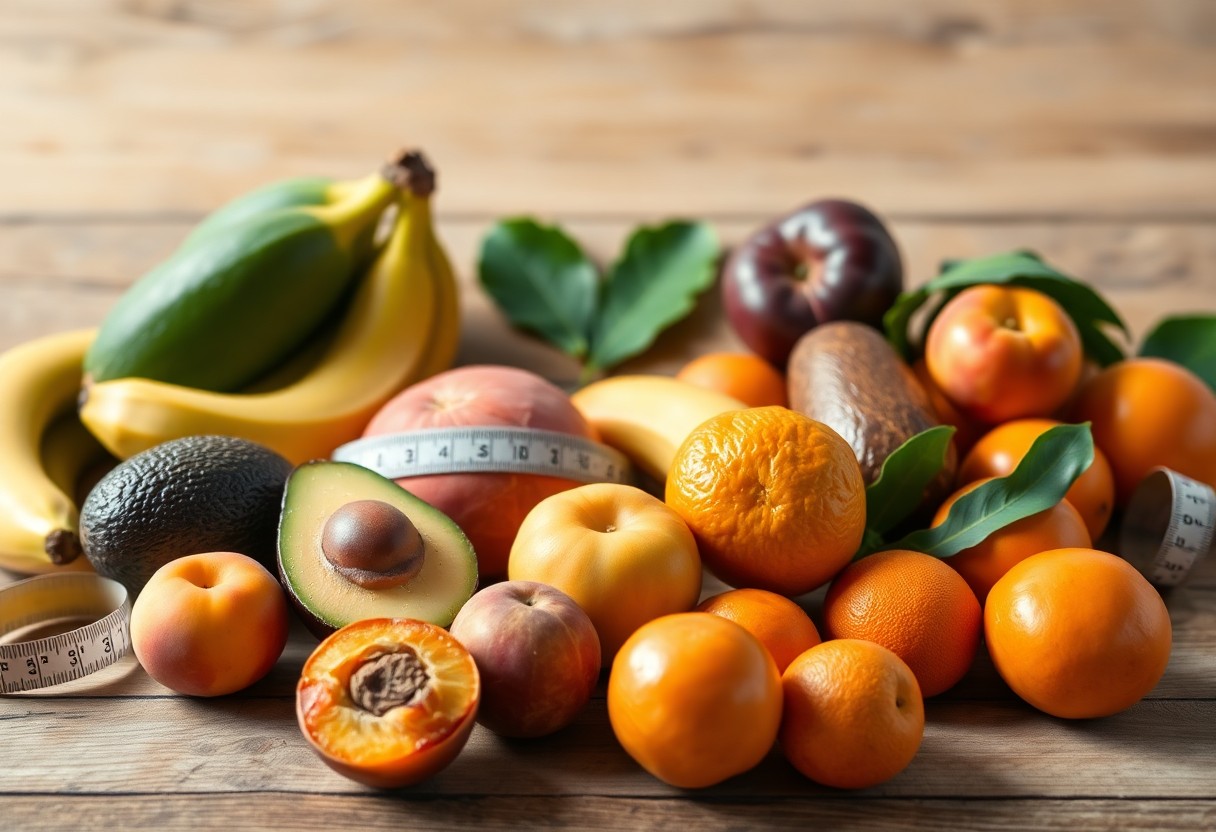Most people overlook the importance of potassium in their diet, which plays a significant role in maintaining heart health and muscle function. By incorporating fruits rich in potassium into your meals, you can support your body’s necessary processes and promote overall wellness. In this post, we will explore the best fruits that can enhance your potassium intake, helping you stay energized and healthy. Get ready to discover delicious options that not only taste great but also contribute to your cardiovascular and muscular well-being.

The Powerful Role of Potassium
Potassium serves as a vital mineral that aids various bodily functions, particularly in maintaining fluid balance and ensuring proper nerve transmission. This key nutrient plays a central role in muscle contraction, digestion, and even impacts your blood pressure levels. A diet rich in potassium can help you stave off conditions like hypertension and cardiovascular diseases, making it necessary for anyone keen on enhancing their overall health.
How Potassium Supports Heart Health
Potassium is instrumental in regulating blood pressure by balancing sodium levels in your body. This mineral helps relax blood vessel walls, which improves blood flow and reduces strain on your heart. Adequate potassium intake has been associated with a lower risk of stroke and heart disease, empowering you to protect your heart health naturally while enjoying potassium-rich foods.
The Connection Between Potassium and Muscle Function
Potassium plays a significant role in muscle function, especially for athletes and active individuals. This mineral helps facilitate muscle contraction and nerve signaling, allowing your muscles to respond effectively during physical activities. By sustaining potassium levels, you can enhance overall performance and prevent muscle cramps during workouts.
The link between potassium and muscle function extends beyond basic contraction; it also influences your body’s recovery process. Adequate potassium intake contributes to reducing muscle soreness and promoting faster recovery after strenuous exercises. It helps maintain the electrolyte balance, which is necessary for optimal muscle performance. Including potassium-rich fruits in your diet not only supports your workouts but also leads to better overall endurance and strength as you engage in physical activities.
The Top Potassium-Rich Fruits for Your Diet
Including potassium-rich fruits in your diet can greatly enhance your heart health and muscle function. Specific fruits stand out due to their high potassium content and overall nutritional benefits. Consuming these fruits regularly can help you meet your daily potassium needs while satisfying your taste buds.
Bananas: Nature's Potassium Powerhouse
Bananas are well-known for their high potassium content, with one medium banana providing around 422 mg of potassium. This makes them an excellent, convenient snack that also supports nerve and muscle function. Their natural sugars provide a quick energy boost, perfect for athletes and active individuals.
Oranges: A Tasty Citrus Source
Oranges are not only deliciously refreshing but also pack a healthy potassium punch, offering about 237 mg per medium fruit. Along with fiber, vitamin C, and antioxidants, oranges can contribute positively to your cardiovascular health.
Besides potassium, the vitamin C in oranges helps improve the absorption of other nutrients, enhancing overall wellbeing. Enjoying an orange as part of your breakfast or as an afternoon snack can uplift your mood and provide lasting energy. Their hydrating properties further make them an ideal fruit choice, especially in warmer months.
Avocados: The Creamy Heart-Healthy Option
Avocados are a fantastic source of potassium, boasting around 975 mg per medium fruit, making them one of the richest sources available. Their creamy texture and healthy fats add a delightful flavor to your meals while promoting heart health.
In addition to potassium, avocados are loaded with monounsaturated fats, which support healthy cholesterol levels. You can incorporate them into salads, smoothies, or even enjoy them on whole-grain toast. The versatility of avocados makes them a delicious way to boost potassium intake while indulging in nutrient-dense foods.
Creative Ways to Incorporate Potassium-Rich Fruits into Your Meals
Enhancing your diet with potassium-rich fruits can be both fun and delicious. You can easily explore a variety of foods and recipes that highlight the nutritional benefits of these fruits. From energizing smoothies to refreshing salads, there are countless ways to enjoy the rich flavors and health advantages of potassium-packed produce. The addition of these fruits into your meals not only boosts your potassium intake but also promotes a heart-healthy lifestyle.
Delicious Smoothies and Juices
Whip up a nutrient-dense smoothie by blending bananas, spinach, and mango with almond milk. This combination packs a potassium punch while providing necessary vitamins and minerals. You can also experiment with other fruits like oranges or kiwi for refreshing juices that keep you hydrated and energized throughout the day.
Creative Salads and Snacks
Incorporating potassium-rich fruits into salads and snacks is an excellent way to boost your nutrient intake. Try adding diced avocados, pomegranate seeds, or sliced kiwi to your leafy greens for a vibrant, tasty salad that is rich in potassium. For a quick snack, opt for a fruit platter featuring bananas, peaches, and figs, which not only delight your palate but also nourish your body.
Exploring potassium-rich fruits in your everyday snacks can turn even the simplest meals into nutrient-dense options. For instance, create a refreshing yogurt parfait using layers of low-fat yogurt, your choice of potassium-filled fruits, and a sprinkle of granola. This not only enhances flavor but also offers a balance of protein and fiber, ensuring sustained energy levels throughout the day. Mixing fruits like pears or strawberries into whole grain wraps with nut butter can also provide a satisfying and healthful boost between meals, keeping those potassium levels up while satisfying your cravings.

The Synergistic Benefits of a Potassium-Rich Diet
A potassium-rich diet not only supports heart and muscle function but also enhances your overall wellness. Incorporating potassium-rich fruits into your meals can help regulate blood pressure, contributing to better cardiovascular health. Additionally, this mineral has been linked to improved electrolyte balance, which plays a vital role in maintaining hydration and bodily functions. By ensuring your diet is rich in potassium, you can unlock these synergistic benefits that promote a healthier lifestyle.
Pairing Potassium with Other Nutrients
Combining potassium with other necessary nutrients amplifies its benefits. For instance, pairing potassium-rich foods with magnesium and calcium can synergistically support bone health and muscle contraction. A diet that balances these minerals not only strengthens your bones but also boosts muscle recovery and function. Foods like bananas, dark leafy greens, and yogurt can provide a potent mix of these important nutrients.
Potassium and Overall Wellness: Long-Term Benefits
A consistent intake of potassium can lead to substantial long-term health improvements. Studies indicate that diets high in potassium are linked to a reduced risk of stroke, heart disease, and kidney stones. Additionally, a potassium-rich diet enhances insulin sensitivity, helping to manage blood sugar levels effectively, which is crucial for your metabolic health.
Long-term benefits of maintaining adequate potassium levels extend beyond just cardiovascular health. Research shows that improved potassium intake can lead to better cognitive function, as this mineral supports proper nerve transmission. Additionally, higher potassium diets can mitigate the risk of developing chronic illnesses like hypertension and diabetes, steering you towards a healthier future. It’s not just about feeling good today; it’s about laying the groundwork for a more resilient and healthier life overall.
To wrap up
From above, you can see that incorporating fruits high in potassium into your diet can significantly benefit your heart and muscle function. By adding bananas, oranges, avocados, and other potassium-rich fruits to your meals, you can support your overall health effectively. Ensuring adequate potassium intake not only helps maintain a healthy heart but also aids in optimal muscle performance. So, make a conscious effort to include these fruits in your everyday diet for better health and vitality.
FAQ
Q: What fruits are considered to be high in potassium?
A: Some fruits that are particularly high in potassium include bananas, avocados, oranges, kiwis, and apricots. Other great options include cantaloupes, honeydew melons, and pomegranates. Incorporating a variety of these fruits into your diet can help you meet your potassium needs.
Q: How does potassium benefit heart health?
A: Potassium plays a significant role in regulating blood pressure, which directly impacts heart health. It helps to maintain proper fluid balance in the body and counteracts the effects of sodium, thereby supporting healthy blood vessels. A diet rich in potassium can reduce the risk of hypertension and related cardiovascular issues.
Q: Can eating fruits high in potassium improve muscle function?
A: Yes, potassium is necessary for muscle contraction and function. It helps in transmitting electrical signals between your nerves and muscles. Consuming fruits rich in potassium can help prevent muscle cramps and enhance overall muscle performance during physical activities.
Q: Are there any risks associated with high potassium intake from fruits?
A: For most people, consuming potassium through fruits is safe and beneficial. However, individuals with certain kidney conditions should be cautious, as their kidneys may not effectively remove excess potassium. It's always best to consult a healthcare professional if you have concerns about potassium intake and your health.
Q: How can I incorporate more potassium-rich fruits into my diet?
A: There are many delicious ways to add potassium-rich fruits to your meals. Consider adding sliced bananas or avocados to your breakfast, snacking on dried apricots or figs, or including citrus fruits in salads. Smoothies featuring various fruits can also be a tasty way to boost your potassium intake.

0 Comments